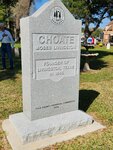
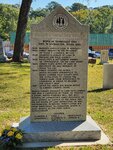
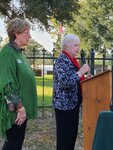
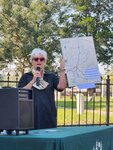
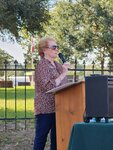
Moses Livingston Choate, the founder of Livingston, the county seat of Polk County, was celebrated Saturday when local citizens gathered to witness the unveiling of a new marker honoring him in the Old City Cemetery. There ceremony was hosted by the Polk County Historical Commission and the City of Livingston.
“I encourage all citizens to celebrate the outstanding 178-year history of Livingston, Texas and honor and appreciate the foresight, service, guidance and generosity of its founder, Moses Livingston Choate,” Mayor Judy Cochran said after reading a proclamation designating Founders Day in his honor.
“Moses Livingston Choate, native of Tennessee, his wife Ursula and their family arrived in the Province of Texas y Coahuila, Mexico in March 1834 and the family settled on the league of land grant in 1834 located in the Northern Division of Liberty County, present day Polk County.
“Choate, in the land business and a carpenter by trade, established a community known as Springfield, started a store, built a water-powered mill, constructed a number of early buildings, served as Justice of the Peace, and was on the Liberty County Board of Land Inspectors.
“By 1840 Choate was the owner of 6,642 acres of land in the Republic of Texas, and in 1846 Choate donated 100 acres to the newly formed Polk County for the seat of government.
“Choate was a member of the Trinity Lodge #14, Swartwout and Livingston, and was instrumental in moving the lodge on the Trinity River to Livingston where it served not only the Masons but was also the first public school house.
“Choate died prior to December 1867 and his widow and family moved to Karnes County, Texas.”
Polk County Judge Sydney Murphy recognized Patricia Snook, president of the Polk County Historical Commission, “who for years has done everything she could for the City of Livingston and Polk County, and I appreciate and thank the Polk County Historical Commission which has become more active, and Museum Curator Betsy Deiterman, who has provided a new set of ideas, all her hard work.
“The man from Tennessee had the vision. He knew what was needed for economic growth. Moses Choate was very much a visionary.
Murphy spoke of the importance of “preserving the history of Polk County … finding those little lost things along the way. If you don’t know where you’ve been, it’s difficult to know where you’re going.
“Thank you for your continued dedication and support and thank you to Moses Choate who demonstrated the grit, the integrity, the sense of honor,” Murphy said.
Cochran gave a brief history of Livingston.
“In 1846, Texas was annexed by the United States. It was now the State of Texas. The State Legislature created a great many new counties, including Polk County. Choate was very active with the community leaders in getting the new county organized.
“In August 1846, he succeeded in convincing the county officials to make ‘Springfield’ the county seat. He accomplished this by granting 100 acres to the county for the county seat. The county could then raise money by selling lots in the new county seat. He also requested that the name be changed from Springfield to Livingston. The gift of the 100 acres and being located more centrally in the county were convincing reasons for the voters to approve the new county seat location and the name change.
“Choate made the donation of the 100 acres and James Andress surveyed the townsite and a plat was filed of record in the County Clerk’s office. Each street was named at this time. Today all the streets of Livingston are the same except for Yale. Yale was renamed Feagin in honor of Judge J.C. Feagin.
“Choate was a charter member of the Trinity Lodge #14 which was organized in 1840 in Swartwout. Choate joined as an ‘Entered Apprentice.’ They built a two-story structure for their meeting hall. Their meetings were held on the second floor and the bottom floor was a school. In 1846, Choate convinced the Masons that they should move their lodge to Livingston. It was moved six miles at the cost of $500. Once again, the lower floor was used for a school. This was Livingston’s first public school. Trinity Lodge #14 is still active. It is the fifth oldest continuous lodge in Texas.
“As a businessman, Choate was busy with whatever came his way. He was a land agent. He would locate land for people. This included finding land to survey under the authority of a land grant or certificate, have it surveyed and gain title to it. Many times, his payment was title to part of that property. He also sold properties from the 4,000 acres in his grant from the Mexican government.
“He worked with wood. He was a carpenter, a cabinet maker, a casket builder and a sawmiller. In the 1840s he had a water-powered, sash style sawmill on the creek that bears his name. He also had a grist mill. He most certainly built many homes and barns with his wood products from his mill.
“He operated the Garner’s Ferry at Swartwout in the years 1844 to 1846. One of his trips was to Houston carrying a team of oxen and cargo. His charge was $16.
“He served Livingston as Postmaster in 1847. He rented space in Isaac Williams Store for $5 per month. This building was where the judicial center is now located. He also served as a Polk County Commissioner for a two-year term in 1848.”
Joyce Johnston, the Polk County Historical Commission’s marker chairman, briefly discussed the steps necessary to getting a historical marker.
“The community has been pretty active with helping get the new marker. Moses Choate gave us this cemetery. The cemetery is full, but the markers over the years have fallen to disrepair. The City of Livingston is in charge of maintenance of the cemetery but we as the commission are the eyes for anything else that may come up. This cemetery is our history.”
Snook thanked everyone for being there.
“I want to personally thank Gary Davis for the many, many hours he spent researching this and compiling the information, and also Mona Rae Marsh, whose vision this was. She goes walking in the cemetery and said, ‘We need to do something.’ We’re so pleased she had this thought,” Snook said.